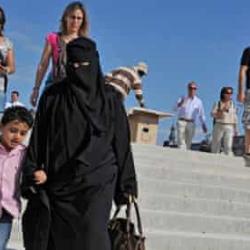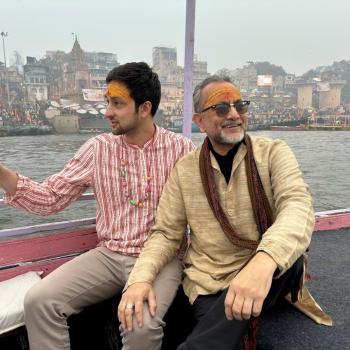By altmuslim contributors
If there were two mantras that flooded the Muslim landscape in 2013, “no more apologies” and “owning our stories” were it. From arts and culture to the Nobel Peace Prize to gender equality to legal victories, Muslims around the world made their mark in many positive ways. For every time Muslims collectively cringed (like with the Boston Marathon bombing), they also celebrated (like when Malala Yousufzai was nominated for the Nobel Peace Prize). Indeed, it was a year to own our own stories and revel in all the good things happening and the healthy debates that ensued. (#Mipsterz, anyone?) With that in mind, altmuslim is continuing in our decade-plus tradition of sharing with you the top ten “good news” stories of 2013 (in no particular order). (See altmuslim’s “Top Ten” lists for 2011, 2010, 2009, 2008, 2007, 2006, 2005, 2004, 2003, and 2002. Yes, we dropped the ball in 2012 — so apologies for that.) We’ve probably missed some great stories, so please feel free to add your thoughts in the comments section below.
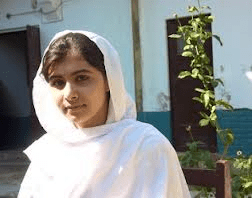
1. Malala Yousufzai nominated for Nobel Peace Prize
Sixteen-year-old student/blogger Malala Yousufzai wasn’t the first girl to be injured in trying to stand up for her right to be educated, but with the help of her social media-savvy peers, Malala became the most famous teenager in the world during 2013. Her plight, recovery, and the dignified way in which she kept the focus on women’s education rather than celebrity, created ripples of global awareness. She went from being hospitalized in critical condition at the start of the year to being celebrated by Time Magazine as one of the 100 most influential people in the world, having pushed Pakistan to enact its first “Right to Education” bill and inspiring millions of girls around the world to believe that education is their birthright. The UN declared her 16th birthday to be “Malala Day,” though she took the opportunity to turn the focus to her cause. “Malala day is not my day,” she declared. “Today is the day of every woman, every boy and every girl who have raised their voice for their rights.”
2. First Muslim fraternity enters U.S. campus life
What could be more American than fraternity life? Brotherhood, teamwork, public service and having fun during your college years — for many young American men, it’s an indispensable part of growing up. And while you may be thinking about some of the more stereotypical aspects of Greek life – alcoholism and hazing abuse come to mind – the truth is that Greek life has a lot to offer. But is there room in this system for Muslims? While Muslim men have been a part of the Greek system as individuals for many years now, this year we saw the emergence of Alpha Lambda Mu/Alif Laam Mim, the first fraternity organized around Islamic principles. “We stay far from what many other social fraternities stereotyped as, including excessive drinking, malignant hazing, and womanizing,” said Ali Mahmoud, the organization’s president and founder. “We provide a comfortable space for young Muslim American men to be themselves.” The first chapter is at the University of Texas at Dallas, but several other campuses have expressed an interest in creating their own chapters.
3. Hijab victory against Abercrombie & Fitch
Clothing retailer Abercrombie & Fitch took a hit in 2013 when it lost a lawsuit filed by former employee Hani Khan, who was fired after four months on the job in 2010 for wearing a hijab. Khan, who was first allowed to wear her hijab as long as it coordinated with the company uniform, was later fired for wearing it when a district manager said it violated the company’s “Look Policy.” A lawsuit filed by the San Francisco Bay Area office of the Council on American-Islamic Relations (CAIR-SFBA), the Legal Aid Society-Employment Law Center (LAS-ELC) and the U.S. Equal Employment Opportunity Commission (EEOC) was upheld by U.S. District Judge Yvonne Gonzalez Rogers, who ruled that Abercrombie & Fitch violated Khan’s federal and state civil rights. “At the heart of this case is the belief that no one should ever have to choose between their religion and work, said Zahra Billoo, executive director of CAIR-SFBA in a press release. “All Americans have a right to reasonable religious accommodation in the workplace, and for Muslim women this includes the right to wear a hijab to work.”
4. Yusuf Islam inducted into Rock & Roll Hall of Fame
Yusuf Islam/Cat Stevens, who has just been inducted into the Rock and Roll Hall of Fame, has now officially come full circle. After leaving the world of music at the top of his career upon embracing Islam in the 1970’s, Yusuf lived a quiet life of philanthropy, starting an Islamic school in London and working on promoting global peace (winning several awards in the process). After 28 years of leaving his fans with only “greatest hits” collections, Yusuf made a return to music in 2003 upon studying the “the long history of music in Islam and Muslim musicians” and deciding that the a conflict between Islam and music did not exist. In the past 10 years, he has re-engaged his old fans and engaged a new generation with two albums, concert tours, a musical (“Moonshadow”) and collaborations with artists such as Dolly Parton. He was reportedly “tickled” by the Hall of Fame honor. “Even though it’s taken time, I’ve always been an optimist,” said Yusuf upon learning of the honor. “I was brought up on the view that if you wait patiently till the end of the story, the good people will live happily ever after. So this is sort of a fulfillment of that idea.”
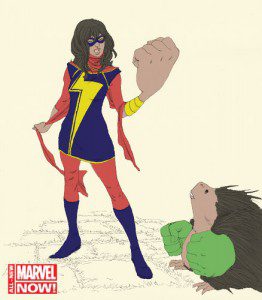
5. Kamala Khan IS Ms. Marvel
It’s a bird, it’s a plane! It’s … well it’s not Superman, nor does this particular superhero fly. But 2013 saw the introduction of the latest comic book superhero, Kamala Khan, bringing comic book fans everywhere into whole new exciting world. Kamala, Marvel Comic’s newest superhero, is part of a growing effort to fill the void of female superhero series while “diversifying its offerings,” as reported by the New York Times. Dubbed Ms. Marvel, Kamala was born from a conversation between Marvel editors Sana Amanat and Steve Wacker, who brought award-winning author (and Muslim convert) G. Willow Wilson to create a new kind of superhero mythos. “It [was] really a chance to do a story about a character who is not a token member of a superhero theme. I [got]to tell the origin story of a superhero. … Creating a superhero from scratch is really awesome; pulling in so many stories from the community of American Muslims, said Wilson in an interview with Altmuslim.
6. First female recitor of the Quran at 50th Annual ISNA Convention
At its 50th annual convention, the Islamic Society of North America (ISNA) opened its proverbial doors as always with a recitation from the Quran. But for the first time ever a woman was chosen to deliver the recitation — Tahera Ahmad, the associate university chaplain at Northwestern University and faculty fellow. Educated at Al-Azhar University in Cairo, among many other places, Ahmad’s recitation was shared hundreds of times over on social media and was heralded by many as a postive step towards more gender equality in Islam. “This is not about creating controversy or fitna” Ahmad told the Huffington Post. “This is about digging deep, doing our research and reviving our Islamic tradition and giving women the opportunity to be part of our rich legacy.”
7. Pope Francis builds bridges with Muslims
Pope Francis is not the first pope to win the respect of Muslims – John Paul II was so loved around the Muslim world that even the Taliban mourned his passing – but his outreach to Muslims during the early days of his tenure has struck a deep chord in Muslim communities around the world. Papal traditionalists noticed something was off when Pope Francis washed the feet of a Muslim woman prisoner in one of his earliest acts as the new pontiff. The pope followed this with many more gestures: sending “prayerful good wishes” to Muslims at the conclusion of Ramadan, writing to Grand Imam of Al-Azhar Ahmed Al Tayyeb to express respect for Islam and call for mutual understanding, and calling for Muslim immigrants to Europe to be embraced “with affection and respect.” “Pope Francis is really doing a wonderful job in terms of outreach,” said Imam Mohamad Bashar Arafat after visiting the Vatican. “[He] resonates with the Muslim world.”
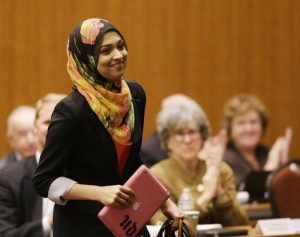
8. First Muslim regent selected for the University of California
With nearly a quarter-million students, the 10-campus University of California is is widely regarded as one of the top public university systems in the world. It is governed by a Board of Regents, who is ultimately responsible for all academic and financial matters. And this year, a Muslim student, Sadia Saifuddin, joined their ranks. Despite being the frontrunner in an extremely competitive selection process to be the student representative on the Board, Saifuddin faced outside pressure to deny her spot based on her political views (she worked on Israel divestment activities on behalf of a campus advocacy group called the Middle Eastern Muslim South Asian Coalition). “I think the position on divestment is irrelevant,” explained Saifuddin. “ It may be my personal opinion, but that has nothing to do with my work as a student regent.” But many Jews associated with the University of California strongly supported Saifuddin. Regent Bonnie Reiss, who is Jewish and served on the selection committee, stood firm by the choice. “Congratulations on raising a remarkable young woman who has the courage to stand up for what she believes in,” she told Saifuddin’s parents.
For years, the Jews and Muslims of Bradford (UK) have lived near each other but without interacting much. While the city is nearly 20 percent Muslim, there is only one synagogue remaining in the city, and at 130 years old was in a state of disrepair, endangering the congregation of 45 families who could not afford repairs. Once the synagogue’s Muslim neighbors found out, however, several of them stepped up to donate the funds required. “It was a challenge which didn’t take us long to decide on,” said Zulfi Karim, secretary of Bradford Council for Mosques. The goodwill sparked continued interaction between the communities, with members of each house of worship visiting each other for the first time in living memory and the communities co-sponsoring street fairs and philanthropic projects. “When I met Rudi [Leavor, the 87-year-old chairman of the synagogue], I felt like he was my father, or grandfather,” Karim says. “If he were an elder in my community, I would be there for him in his time of need. So I felt – well, it’s my obligation to help him as if he were a member of my own family.” (This story mirrors a similar 2012 Good News story that took place in New York City.)
It started with a group. That group made a music video. That music video was set to Jay Z’s “Somewhere in America … ” And that video was uploaded to social media. And then things got very interesting. The #Mipsterz (a group calling themselves “Muslim Hipsters“) video featuring stylishly-clothed women in all forms of the hijab doing all sorts of cool things (skateboarding, posing, chopping wood) sparked a flurry of conversation, debate and interest regarding artistic form, use of the hijab, what modesty means, and really — was the hijab debate the point of the video? Islamic Monthly editor Sana Saeed wrote this critique of the video, to which Altmuslim’s Rabia Chaudry countered with her thoughts, and Aminah Sheikh, who participated in the video, chimed in as well. The debate and conversations flowed back and forth, fast and furious, causing some to wonder what the deal really was about a music video. (For some, it was the choice of the music, which included the use of the N-word, for others it that all of the women featured in it wore stylized versions of the hijab, and for others, it wasn’t about any of these things, but more so about artistic expression.) You may wonder why this story is included in our list. At the end of the day, it was a time of debate, self-reflection and growth for the American Muslim community. That so many of us got so fired up over a video says something.
So many other good Muslim stories happened in 2014. What did we overlook? Please post your thoughts below in the comments section!




